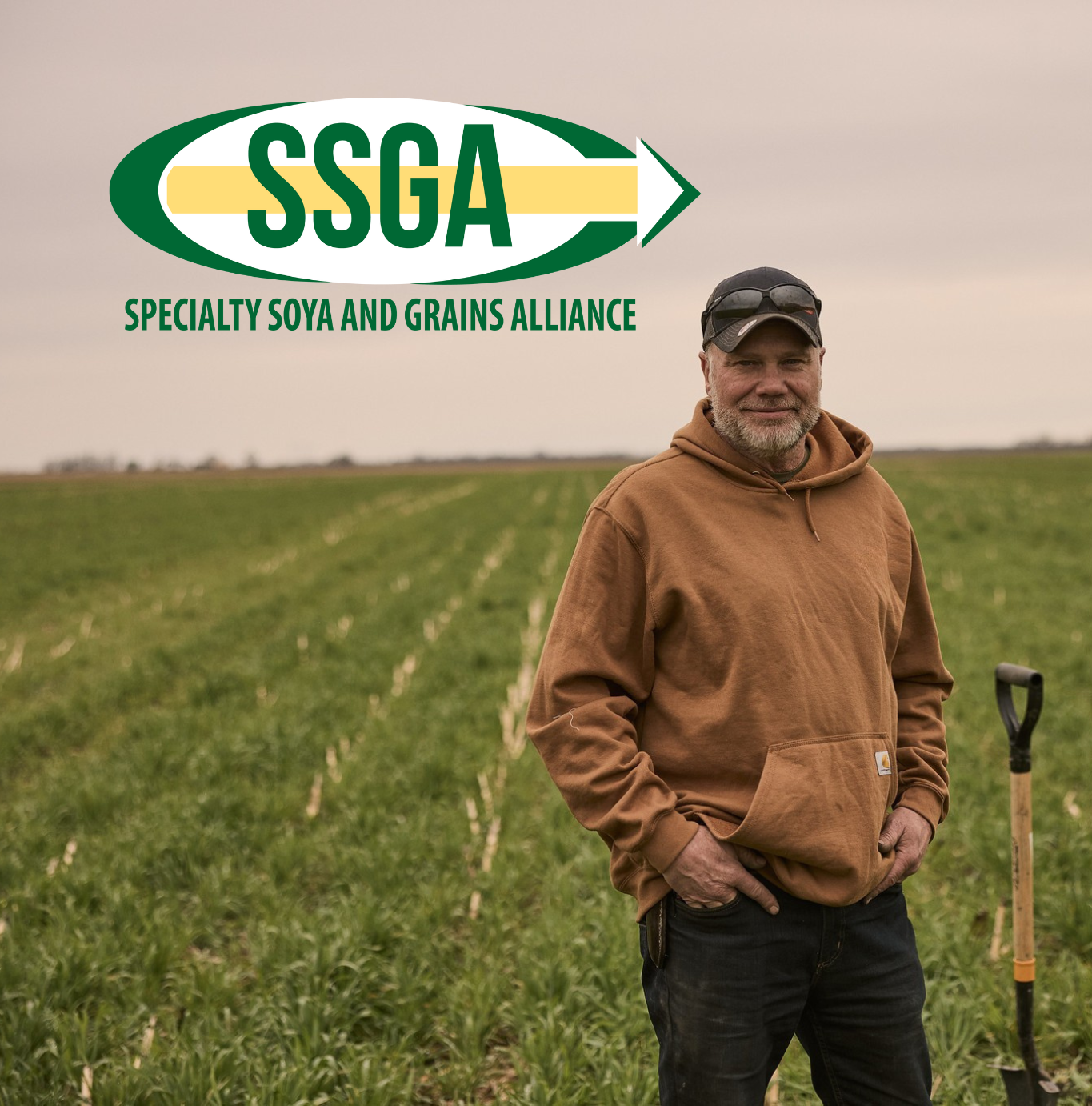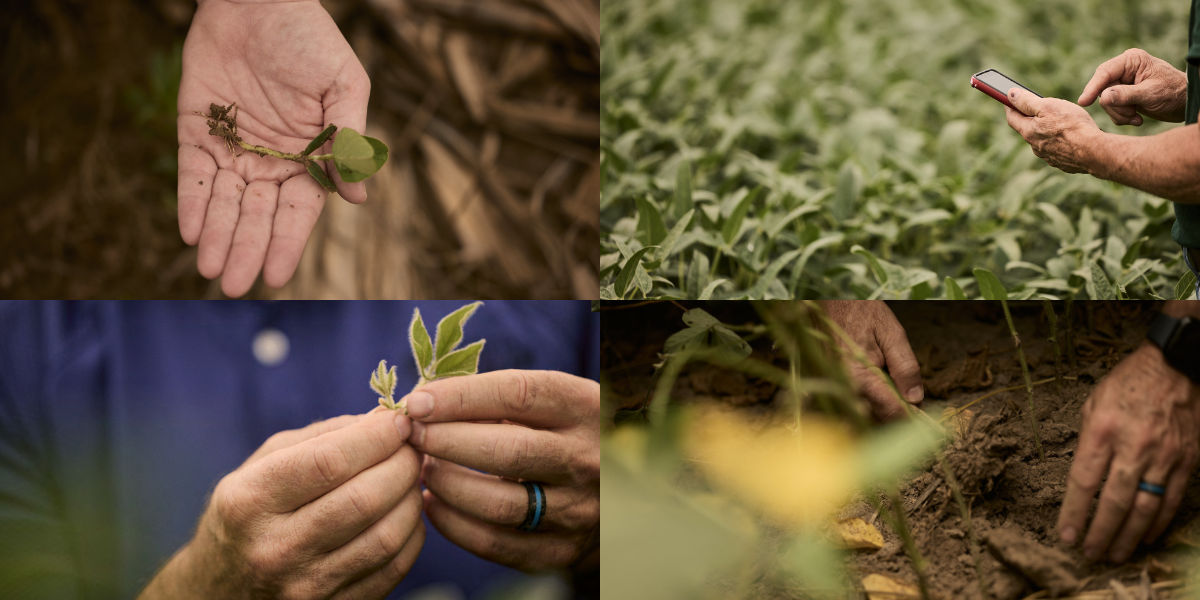The Specialty Soya and Grains Alliance (SSGA) is a leading voice of identity-preserved (IP) agriculture in the U.S. IP soybeans are often food-grade, non-GMO soybeans that exceed the U.S. Department of Agriculture’s (USDA’s) No. 1 grade quality standards. They feature either specific varieties or have special traits – such as a higher protein or sugar content, or a certain color or size – and a specific end use, such as natto (a Japanese dish made from fermented soybeans), tofu, miso and soymilk, to name a few.
Processors pay farmers a premium to grow IP soybeans. In exchange, farmers commit to keeping them segregated from other crops to avoid comingling and cross-contamination.
Since SSGA’s inception in 2019, Illinois Soybean Association (ISA) has been one of its biggest supporters, providing vital funding for key initiatives through its checkoff program.
This past March, at SSGA’s annual meeting, Illinois farmer and ISA Chairman Bryan Severs was elected as SSGA’s new chairman, further strengthening the ties between the two organizations.
“As a grower of food-grade non-GMO soybeans, I bring a firsthand perspective to end users about what we do in the U.S. to maintain the quality of the crop they’re purchasing,” Severs said.
Severs first joined the SSGA board in 2024 after hosting a group of foreign buyers at his farm during SSGA’s Fork to Farm Day in Illinois.
“During that event, I saw the passion of SSGA staff and board members, and it made me want to be part of their group,” he said.
The High Quality Specialty Grains Program
Over the course of its short but impactful history, SSGA has established a number of initiatives to help the U.S. IP and specialty soy industry build, expand and sustain a reliable supply chain that ensures the integrity of the end product. One of its biggest success stories is the High Quality Specialty Grains (HQSG) inspection program.
“This program streamlines the process for obtaining phytosanitary certificates, making it easier for specialty soy exporters to get containers turned around more quickly,” Severs said. “It reduces costs for our exporting members and, in turn, helps maintain a strong market for specialty soy growers to earn a premium.”
The HQSG program was created to address phytosanitary requirements on soybeans and soybean meal imports issued by Japan in 2020. Because Japan is by far the biggest market for specialty soybeans, accounting for more than 50% of U.S. sales, these requirements threatened to saddle the industry with burdensome costs and a time-consuming process. SSGA took swift action. It first negotiated a three-year moratorium with authorities in Japan and then partnered with USDA’s Animal and Plant Health Inspection Service (APHIS) to develop a business-friendly solution.
“After running through a number of options with SSGA, we came up with the HQSG program, a completely unique approach that borrowed some of the principles applied to other commodities,” said George Galasso, National Trade Manager for Grains at APHIS.
To participate in the program, companies first undergo an audit and special training through SSGA. Once certified, these companies are able to use the streamlined process to obtain APHIS phytosanitary certificates more quickly.
“Enrolling in the HQSG program has made us more efficient in almost every aspect of our business,” said Cameron Hilgenberg, Food Grade Soy Export Manager for The DeLong Company. “There’s less of a paperwork bottleneck to get timely phytosanitary certificates, and we can turn containers around much faster. Our numbers have improved substantially. The. increased flexibility this program. offers may have doubled or tripled our capacity.”
SSGA reports that, under the program, there have been more than 5,000 applications for phytosanitary certificates thus far, and APHIS indicates not a single complaint has been received from a foreign buyer.
“SSGA has done an excellent job ensuring that this program is running smoothly without any unforeseen complications,” Galasso said.
Growing Specialty Soybeans
The benefits of the program extend up and down the value chain. It enables exporters to position themselves as reliable suppliers in markets with many just-in-time buyers and also bestows a reputation for quality for U.S. grain in general. For growers, it strengthens the specialty soybean market, providing them with a good option to earn a premium and diversify their crop rotations.
“Conservation also plays a big role in how we sell to our buyers,” Severs said. “They like to know that we’re doing our best to reduce our carbon footprint, to use less fuel and that our farming practices are sustainable.”
Farmers interested in growing specialty soybeans can start by visiting the SSGA website’s members page (soyagrainsalliance.org/ssga-members) and finding a processor-exporter in their region. More than 90% of food-grade soybeans are pre-contracted, with companies typically signing up farmers between September and December.
Opportunities for Expansion
Based on the HQSG program’s impeccable track record, SSGA and APHIS are looking to expand the program to other specialty grains. Meanwhile, SSGA continues to seek opportunities to grow overseas markets for U.S.-origin food-grade soybeans. SSGA Executive Director Randy Duckworth has his eye on the Philippines and Taiwan and points to growing markets for tofu in Indonesia and Vietnam, and to the increased use of U.S. soybeans in Indonesia’s soymilk market and Vietnam’s tofu market. Additionally, negotiations are presently underway to secure an import quota from India.
“These are complicated markets, and anything we can do to make it easier to meet their phytosanitary requirements helps us expand opportunities for food-grade soybean farmers,” Duckworth said.
Checkoff Partnerships
SSGA is supported through the checkoff program of the Illinois Soybean Association and other qualified state soybean boards (QSSBs). In addition to the HQSG program, SSGA benefits its members through several other initiatives. Its U.S. Identity Preserved program, for instance, provides members with a quality assurance plan that qualifies them to use the Identity Preserved United States label, indicating a high-quality product of U.S. origin. SSGA also helps members navigate the complexities of intermodal transportation and shipping and offers farmers resources to learn about the IP process and growing IP crops.
For more information on these and other programs, visit the SSGA website (soyagrainsalliance.org) and the U.S. Identity Preserved website (usidentitypreserved.org).
Recent Articles
In this issue of Illinois Field & Bean Magazine, we're looking forward to the 2026 Soybean Summit.
By
Sulfur is essential for plant growth, yet it's only just becoming a common addition to fertilizer management plans. This shift is no coincidence.
By Darby Danzl, ISA Regional Technical Agronomist

